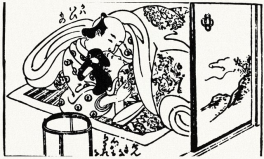Nenja: Difference between revisions
From BoyWiki
Added an image and two internal links, and made a change to the second paragraph of the article |
Modified a reference, and added a blank line to the wikicode |
||
| Line 3: | Line 3: | ||
'''Nenja''' (念者, "lover" or "admirer"), in premodern [[Japan]], was a term applied to the older and sexually active male partner involved in a [[Homoerotic (dictionary)|homoerotic]] relationship with a ''[[wakashū]]'' (若衆, "youth"), a sexually passive [[Adolescence|adolescent]] boy, in the context of the historical practice of ''[[shudō]]'' (衆道,"the way of youths"), also known as ''[[nanshoku]]'' (男色, "male love"). | '''Nenja''' (念者, "lover" or "admirer"), in premodern [[Japan]], was a term applied to the older and sexually active male partner involved in a [[Homoerotic (dictionary)|homoerotic]] relationship with a ''[[wakashū]]'' (若衆, "youth"), a sexually passive [[Adolescence|adolescent]] boy, in the context of the historical practice of ''[[shudō]]'' (衆道,"the way of youths"), also known as ''[[nanshoku]]'' (男色, "male love"). | ||
The sense of the word can be rendered as "a person who thinks of a particular youth", the character ''nen'' (念) being of difficult translation, as its meaning falls somewhere between rational "thinking" and emotive "feeling". Unlike the term ''wakashū'', its counterpart ''nenja'' had no age signifier, although there was in principle an expectation that the lover would be older than his beloved.<ref>Gregory M. Pflugfelder, ''Cartographies of Desire: Male-Male Sexuality in Japanese Discourse, 1600–1950'' (Berkeley: University of California Press, | The sense of the word can be rendered as "a person who thinks of a particular youth", the character ''nen'' (念) being of difficult translation, as its meaning falls somewhere between rational "thinking" and emotive "feeling". Unlike the term ''wakashū'', its counterpart ''nenja'' had no age signifier, although there was in principle an expectation that the lover would be older than his beloved.<ref>Gregory M. Pflugfelder, ''Cartographies of Desire: Male-Male Sexuality in Japanese Discourse, 1600–1950'' (Berkeley: University of California Press, 1999), p. 36.</ref> | ||
==References== | ==References== | ||
{{reflist}} | {{reflist}} | ||
Revision as of 10:46, 18 August 2021

Nenja (念者, "lover" or "admirer"), in premodern Japan, was a term applied to the older and sexually active male partner involved in a homoerotic relationship with a wakashū (若衆, "youth"), a sexually passive adolescent boy, in the context of the historical practice of shudō (衆道,"the way of youths"), also known as nanshoku (男色, "male love").
The sense of the word can be rendered as "a person who thinks of a particular youth", the character nen (念) being of difficult translation, as its meaning falls somewhere between rational "thinking" and emotive "feeling". Unlike the term wakashū, its counterpart nenja had no age signifier, although there was in principle an expectation that the lover would be older than his beloved.[1]
References
- ↑ Gregory M. Pflugfelder, Cartographies of Desire: Male-Male Sexuality in Japanese Discourse, 1600–1950 (Berkeley: University of California Press, 1999), p. 36.